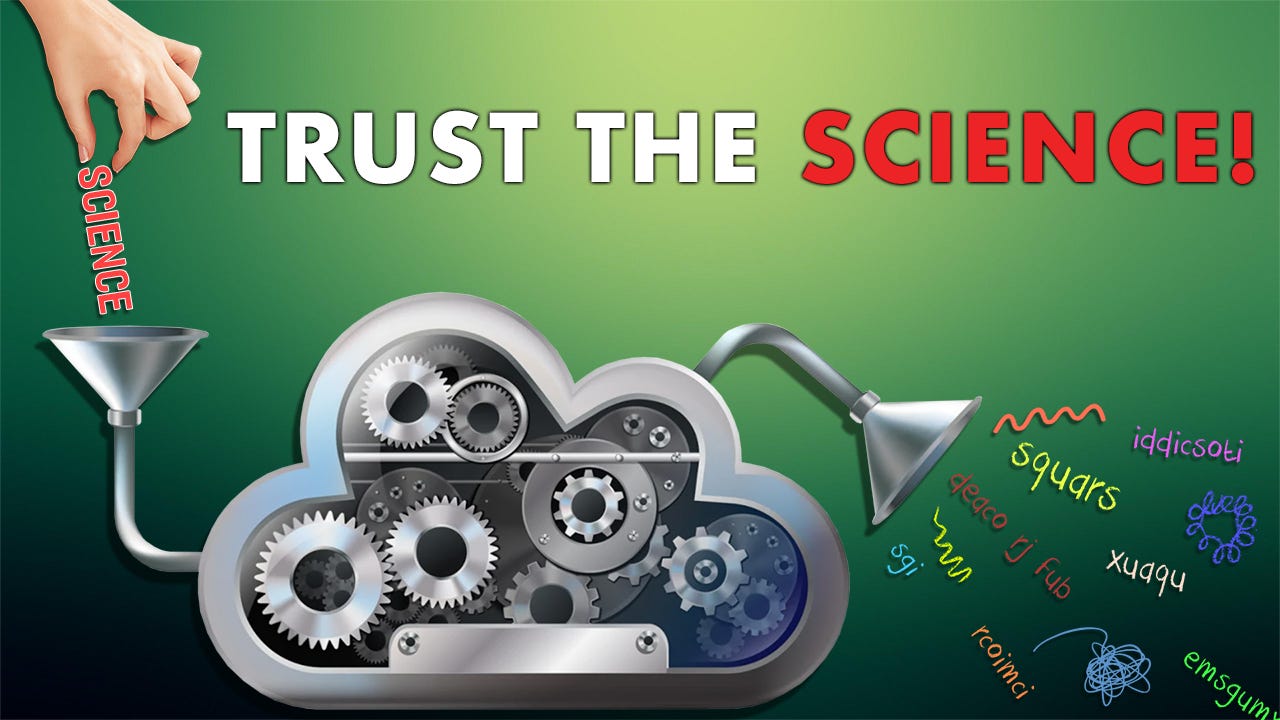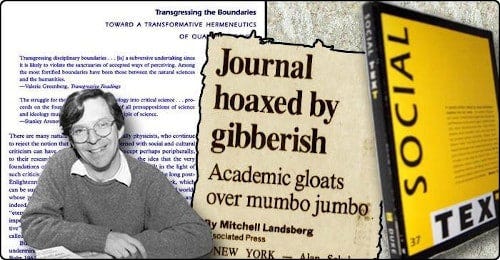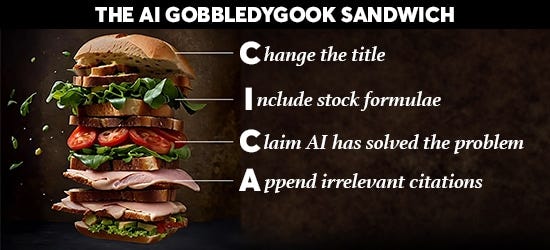Trust the (Computer-Generated Gobbledygook) Science!
by James Corbett
corbettreport.com
June 16, 2024
"Trust The Science!"
This is the mantra of the technocratic tyrants. The rallying cry of the Orwellian thought police. The injunction of the modern-day censors who would seek to rid the marketplace of ideas of any and all opposition.
If you're reading these words, you already know this. Or you should know this, given that the reason I was censored from ThemTube back in 2021 was because I dared to produce a podcast about the philosophy of science that sought to interrogate and dismantle the "Trust The Science!" injunction.
Let's cut to the chase: in this post-COVID era, anyone with their head screwed on straight knows that "Trust The Science!" is a stupid, baseless, self-refuting piece of nonsense that is wielded by authoritarians as a cudgel against political dissent.
But as stupid as the "Trust The Science" phrase is, it's about to get even stupider.
Why? Because a story emerged last month that completely undermines whatever misplaced faith the average propaganda-swallowing rube still harboured about the trustworthiness of "the" science and the supposedly self-correcting peer review process that "the" science is built on.
Strap in, folks. This story is bonkers. And it points to a future that's so horrifyingly dystopian that not even the "Trust The Science!" thugs will be able to defend it.
THE OLD PROBLEM
Remember the "Sokal affair"?
You might not know it by name, but I'll bet you heard the story. Back in 1996, Alan Sokal was a physics professor at New York University and University College London who was, in his own words, "troubled by an apparent decline in the standards of rigor in certain precincts of the academic humanities." Rather than write some scholarly treatise about his concerns, however, he decided to demonstrate the problem in a provocative (and hilarious) way: by hoaxing a peer-reviewed humanities journal.
Sokal recounts:
So, to test the prevailing intellectual standards, I decided to try a modest (though admittedly uncontrolled) experiment: Would a leading North American journal of cultural studies—whose editorial collective includes such luminaries as Fredric Jameson and Andrew Ross—publish an article liberally salted with nonsense if (a) it sounded good and (b) it flattered the editors' ideological preconceptions?
Unsurprisingly, the answer to that question was an emphatic "Yes!"
Specifically, Sokal wrote "Transgressing the Boundaries: Toward a Transformative Hermeneutics of Quantum Gravity," a perfectly incomprehensible piece of balderdash that seeks to deconstruct "the long post-Enlightenment hegemony over the Western intellectual outlook" by critiquing the very language of science—mathematics and logic—and its "contamination" by "capitalist, patriarchal and militaristic" forces.
"Thus, a liberatory science cannot be complete without a profound revision of the canon of mathematics," Sokal's satirical paper concludes before conceding: "As yet no such emancipatory mathematics exists, and we can only speculate upon its eventual content."
Along the way, he engages in an impressive-sounding but completely irrelevant discussion of esoteric concepts from theoretical physics, including "the invariance of the Einstein field equation under nonlinear space-time diffeomorphisms" and "whether string theory, the space-time weave or morphogenetic fields" will ultimately provide the answer to the "central unsolved problem of theoretical physics."
In his post-hoax confession, "A Physicist Experiments With Cultural Studies," Sokal notes that he deliberately peppered the article with silly pseudoscientific gibberish "so that any competent physicist or mathematician (or undergraduate physics or math major) would realize that it is a spoof."
So, why did the article pass the muster of peer review? In Sokal's estimation:
It's understandable that the editors of Social Text were unable to evaluate critically the technical aspects of my article (which is exactly why they should have consulted a scientist). What's more surprising is how readily they accepted my implication that the search for truth in science must be subordinated to a political agenda, and how oblivious they were to the article's overall illogic.
Stroking the egos of the editors of Social Text by suggesting that physics was too important to be left up to actual scientists and instead needs to be supplemented with critical theory reflecting feminist and anti-capitalist ideologies, the nonsense paper was, naturally enough, accepted for publication and duly printed in Social Text's Spring/Summer 1996 issue on "Science Wars."
Sadly, this hoax did not sufficiently shame the editors and peer reviewers of the humanities journals into doing a better job. On the contrary. It led, over the ensuing decades, to a number of similar (and increasingly ridiculous) hoax papers being published.
Remember the "Grievance studies affair"? In that Sokal-like hoax, which took place over 2017 and 2018, three separate authors—Peter Boghossian, James A. Lindsay, and Helen Pluckrose—wrote not one but twenty separate hoax articles to demonstrate that nothing had improved since the time of Sokal's original gambit. If anything, the development of critical social theory and so-called "grievance studies" had actually made things worse in the intervening two decades.
In order to really push the experiment to its limits, the trio ensured that "each paper began with something absurd or deeply unethical (or both) that we wanted to forward or conclude."
Some examples of papers that were not merely submitted during this raid on academia included:
"Human reactions to rape culture and queer performativity at urban dog parks in Portland, Oregon," a paper published in Gender, Place and Culture that purported to address "questions in human geography and the geographies of sexuality" by observing the behaviour of dogs and dog owners at dog parks to "determine when an incidence of dog humping qualifies as rape";
"When The Joke Is On You: A Feminist Perspective On How Positionality Influences Satire," a paper accepted for publication by Hypatia, a leading feminist philosophy journal, which argues that academic hoax papers are in fact a "sophisticated but empty form of privilege-preserving epistemic pushback that seeks to resolve epistemic discomfort by mimicking certain ideas convincingly so as to offer them up for ridicule to others who are similarly epistemically protectionist";
"Our Struggle Is My Struggle: Solidarity Feminism As An Intersectional Reply To Neoliberal and Choice Feminism," a paper accepted for publication by Affilia: Feminist Inquiry and Social Work that—the hoaxsters later admitted—was "based upon a rewriting of roughly 3,600 words of Chapter 12 of Volume 1 of ‘Mein Kampf," and involved swapping out Hitler's anti-Jew invective for the anti-patriarchal invective of modern femi-Nazi-ism; and
"The conceptual penis as a social construct," published in Cogent Social Sciences, which argues . . . well, I'll let you read that one for yourself.
Of course, all of these papers were either retracted or rejected for publication . . . once the hoaxers admitted the hoax to The Wall Street Journal. It was only after the trio came clean that the "respected" and "peer-reviewed" journals—gatekeepers of "the" science—realized they'd been had, setting off a firestorm of publicity and public hand-wringing about the state of the social sciences.
"But ACKSHUALLY," inject the defenders of The Science, "the journals all retracted and disowned the papers once they were discovered to be fraudulent, which just shows that science is self-correcting after all, doesn't it? And anyway, the hoaxers are just revealing their insecurities about their own genitalia! Trust The Science, guys!"
. . . But then, why do absurd papers like "Glaciers, gender, and science: A feminist glaciology framework for global environmental change research"—an article published in Progress in Human Geography that calls for the construction of "a feminist glaciology"—continue to get published? (For what it's worth, that paper was apparently not a hoax . . . but you could've fooled me!)
What these hoaxes have demonstrated in dramatic fashion is a point that has been well-known to the academics working in the heart of the academic sausage-making factory for some time: peer review is—despite the assurances of the "Trust The Science!" crowd—no guarantee of scientific merit.
Yes, normal human beings who make their living in the free market by providing products or services of use to their fellow community members have known for a long time that all is not well in the land of "the" science, where increasingly bought-and-paid-for researchers make their living by scrabbling for government handouts or selling themselves to the highest corporate bidder.
But—and I get you're going to have a hard time believing this—as bad as all that is, it pales in comparison to the new problem that cropped up last month.
THE NEW PROBLEM
Surely human-generated hoax papers being published by "respectable" academic journals are the bottom of the barrel when it comes to "the" science, isn't it?
Nope.
Back in 2005, a team of MIT grads created "SCIgen - An Automatic CS Paper Generator," a program that "generates random Computer Science research papers, including graphs, figures, and citations."
Slate did an exposé on the MIT project in 2014, in which it summarized: "Thanks to SCIgen, for the last several years, computer-written gobbledygook has been routinely published in scientific journals and conference proceedings."
What should be doubly shocking to those who have hitherto unquestioningly trusted "the" science is that between 2005 and Slate's 2014 exposé, unscrupulous SCIgen users had already managed to get 120 of their algorithmically-generated gibberish articles published in academic journals.
This remarkable feat of deception generated much hand-wringing from the scientific community and caused science communicators to spill gallons of (digital) ink writing soul-searching articles about where the hallowed institution of peer review went wrong and how academics can work together to right the ship and restore public faith in the institution of Science.
So, did all this sanctimonious soul-searching result in the end of the era of gibberish articles?
Nope.
In fact, a 2021 study found that a whopping 243 SCIgen-generated papers had been published by academic journals. Of them, only 12 had been retracted and another 34 had been silently removed. In other words, even years after the problem was first exposed, there were still hundreds of unretracted gibberish articles cluttering up the scientific record.
But if a nearly-two-decades-old computer program for generating scientific-sounding nonsense sounds a bit quaint in the face of today's ChatGPT-dominated age of Large Language Models, well . . . you're right! It is.
Forget the 243 SCIgen-generated fake papers. Last month, The Wall Street Journal reported that Wiley, a 217-year-old stalwart of the scientific publishing industry, was retracting more than 11,300 fraudulent articles and closing 19 journals.
According to the report:
In the past two years, Wiley has retracted more than 11,300 papers that appeared compromised, according to a spokesperson, and closed four journals. It isn’t alone: At least two other publishers have retracted hundreds of suspect papers each. Several others have pulled smaller clusters of bad papers.
Although this large-scale fraud represents a small percentage of submissions to journals, it threatens the legitimacy of the nearly $30 billion academic publishing industry and the credibility of science as a whole. [Emphasis added.]
Now, the fact that academic publishing is a $30 billion industry should give the first clue to the fact that "the" science is not the impartial pursuit of objective truth that the technocratic tyrants want to convince us it is. But the way this industry was gamed belies a degree of disregard for the scientific pursuit that is galling even to those who are already familiar with The Crisis of Science.
To be sure, this was not some sophisticated scam in which well-informed criminal gangs carefully fine-tuned an AI algorithm to cleverly trick the academic peer reviewers. Instead, the operators of these fake paper mills employed what one researcher christened "the AI Gobbledygook sandwich," a very simple algorithm for transforming a genuine scientific article into a piece of sciency-sounding gobbledygook that is (apparently) good enough to pass peer review.
Here's how the sandwich is made.
First, a genuine scientific article is pilfered and its title is changed to relate the paper to a popular research topic. Then, a technical section is ginned up from stock formulae and standard definitions. Next, a results section is added purporting to show how AI has been applied to a public dataset to shed new light on the issue under examination. Finally, some irrelevant citations are appended to give the paper the appearance of academic credibility.
Et voilà! Le Sandwich de Gobbledygook is served!
The interesting thing about this scam is not just that it involves a computer algorithm using a Large Language Model to gin up some superficially convincing bafflegab but that it relies on the cachet of AI research itself to then get the paper published. "Hey guys, AI has been used to tackle a problem in a whole new way! Look at the amazing results."
The story of this scandal is worth reading in its entirety, as it raises some interesting points to ponder.
First of all, the fact that at least 11,000 (!) of these nonsense papers have actually been published indicates that the entire "peer review" process is a joke.
But secondly, it confirms what anyone who has worked in, around or anywhere near academia has known for a long time: no one is reading these journals anyway. No working academic gives a flying hoot about whatever new study has been published in the Journal of East Mongolian Invertebrate Feminist Endicronology Studies Quarterly or any other obscure corner of this $30 billion publishing industry. These journals and the gibberish papers that fill their pages exist only to give researchers another "peer-reviewed publication" credit for their academic CV.
Now, in case you think I'm exaggerating the problem here, or in case you suspect that these AI Gobbledygook Sandwich-generated articles might have some scientific merit after all, I invite you to cogitate on this story:
By all means, go ahead and read that article and discover all the sordid details of how "a prominent scientific journal" ended up publishing "an AI-generated image of a rat with large genitals alongside strings of nonsensical gibberish words." But really, just look at it for yourself, and remember: this was published in a prominent, peer-reviewed scientific journal!
One must ask: is this "The Science" we are meant to be putting our trust in? Someone get Dr. Fauci on the line!
But, hey, look at the bright side: it can't get any worse than this, right?
I mean, surely we've hit the rock bottom of this academic nadir, haven't we?
We can't possibly have even less reason for "Trusting The Science" going forward, can we?
THE NEW PROBLEM GETS EVEN WORSE
So, you think "respectable" academic journals publishing AI Gobbledygook Sandwich-generated articles is as bad as it gets?
Well, strap in, because I'm about to blow your mind: what if the "peer reviewers" are themselves AI?
Actually, that's a trick question. There's no "what if" about it! AI is already being used to "assist" the peer-review process.
As "AI-Assisted Peer Review," a 2021 article published in Humanities and Social Sciences Communications (a "fully open-access, online" peer-reviewed journal published by Nature Portfolio) helpfully explains:
The scholarly communication process is under strain, particularly because of increasing demands on peer reviewers and their time. Manuscript submissions to peer-review journals have seen an unprecedented 6.1% annual growth since 2013 and a considerable increase in retraction rates (Publons, 2018). It is estimated over 15 million hours are spent every year on reviewing of manuscripts previously rejected and then resubmitted to other journals.
Oh, no! Won't someone think of the children peer reviewers!
Thankfully, the technocratic AI overlords are here to help:
Developments that can make the quality control/assurance process associated with research outputs, particularly the peer review process, more efficient are likely to be welcomed by the research community. There are already a number of initiatives making use of automated screening tools in areas such as plagiarism prevention, requirements compliance checks, and reviewer-manuscript matching and scoring. Many of these tools make use of artificial intelligence (AI), machine learning and natural language processing of big datasets.
That's right, folks. In order to help those beleaguered peer reviewers suffering from the deluge of (mostly AI-generated) articles to review, they're turning to . . . AI! What could go wrong?
It's important to understand this isn't some fringe idea. Quite the contrary. In fact, the idea of AI peer review seems to be one of the hottest topics in peer-reviewed periodicals these days, with articles in Nature and the Journal of Medical Research and Learned Publishing and Springer Nature and ACS Energy Letters and numerous other journals tackling the subject in recent years.
Given how quickly the idea of AI-assisted (or even AI-driven, human-"assisted") peer review has been normalized in academia, it's possible to gloss over just how absolutely bonkers this state of affairs is.
In order to really get your head around the insanity, I suggest you read "How generative AI will ruin science and academic research," a recent article on the subject at the "shadowrunners" Substack that delves into the philosophical ramifications of this development.
As the author of that article notes:
You’ll have AI reviewers checking papers written by algorithms published in journals to be read by nobody. Except perhaps the AI themselves, now generating their own training data in a wicked informational feedback loop that’s going to be replete with structurally integrated hallucinations.
So where’s the quality control? How is it even conceivable? Who will do the “fact-checking” of the torrents of AI-generated material? And in reference to what data? AI-generated or curated research articles whose information has been disconnected from reliability, objectivity and validity, and is now being produced towards the end of reinforcing profitable consumer behaviour and strategic opinion formation?
Yes, the AI ouroboros is now primed to start eating its own tail.
Pretty soon, it's conceivable that some significant portion of the $30-billion-a-year academic publishing industry will consist of "AI" (that is, Large Language Models) generating gobbledygook articles that will be peer-reviewed by other "AI" (LLMs) that have been trained on gobbledygook content generated by "AI" (LLMs).
Garbage in, garbage out, indeed.
THE SOLUTION
As I wrote above, while the particularities of this AI-generated conundrum may be novel, there is nothing new in the idea that the publish-or-perish nature of the modern academic enterprise is fundamentally perverting our institutional methods of knowledge production. In fact, all of this should be very familiar to those who have seen my presentation on The Crisis of Science.
Oh wait, you haven't seen "The Crisis of Science" yet? Let's correct that deficiency now, then, shall we?
Watch this video on BitChute / Rumble / Odysee / AltCensored or Download the mp4
As usual, it's important to know about the problem, but only insofar as that knowledge can point us toward the solution to that problem. Which, as I'm sure you know, is the reason I followed up my podcast on The Crisis of Science with a podcast on Solutions: Open Science.
What, you haven't seen my presentation on "Solutions: Open Science" yet? No time like the present!
Watch this video on BitChute / AltCensored / Odysee or Download the mp4
Long story short: yes, there is a solution to this mess, but it's not going to come from relying on AI to sort out the problem that AI is creating.
And it's not going to come by "Trusting The Science."
It's going to come from a fundamentally different, decentralized, open source approach to knowledge acquisition and a decentralized, horizontal peer critique that takes the conversation out of the hands of the bought-and-paid-for academic publishing industry and puts it back into the hands of the researchers and interested laymen.
The good thing is that this conversation is already happening, it's just not being advertised by the technocrats and their corporate scientist minions and their AI-controlled academic journals and the establishment scientific press. And, now that you know about it, you, too, are part of the solution!
Spread the word: "Trust The Science!" is dead. "Become the Science" is what the cool kids are saying now.
Like this type of essay? Then you’ll love The Corbett Report Subscriber newsletter, which contains my weekly editorial as well as recommended reading, viewing and listening. If you’re a Corbett Report member, you can sign in to corbettreport.com and read the newsletter today.
Not a member yet? Sign up today to access the newsletter and support this work.









